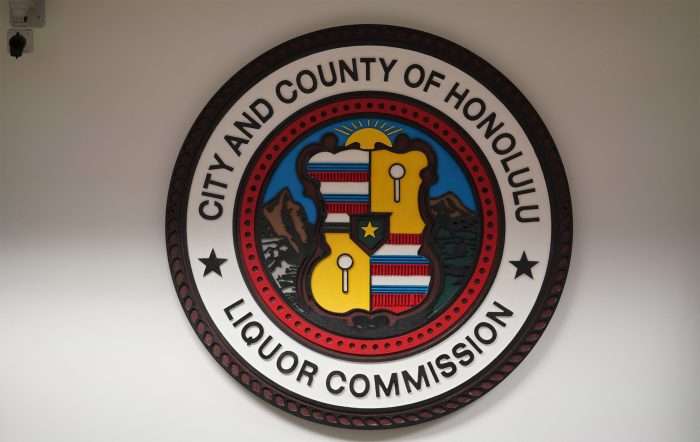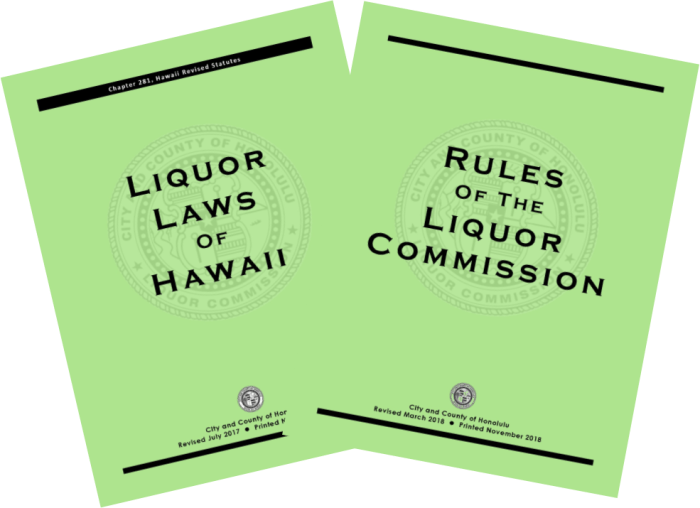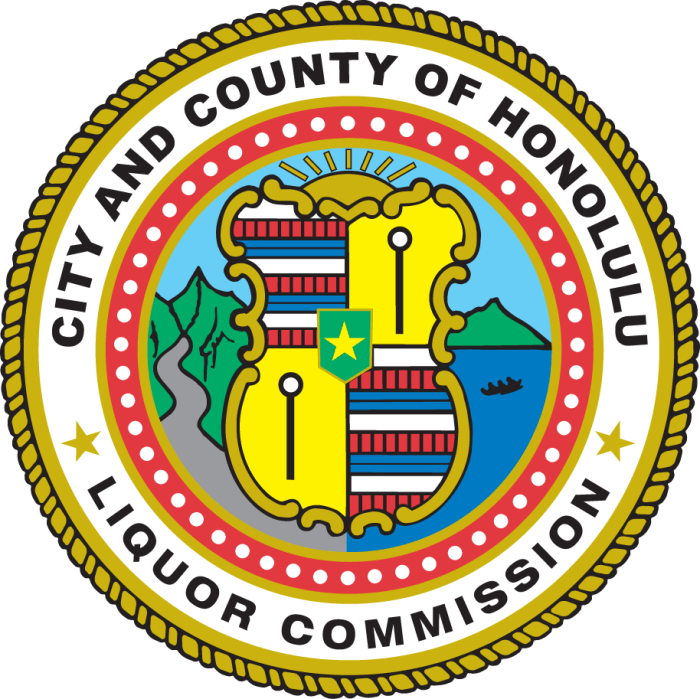The Honolulu Liquor Commission Blue Card, a cornerstone of the local liquor industry, holds immense significance in regulating and monitoring alcohol consumption within the city. This comprehensive guide delves into the purpose, eligibility, benefits, and responsibilities associated with obtaining a Blue Card, exploring its impact on businesses, consumers, and the overall economy.
Furthermore, it examines the regulations and compliance requirements that Blue Card holders must adhere to, outlining the consequences of violations and providing guidance on maintaining compliance. The role of the community in supporting and monitoring Blue Card holders is also discussed, highlighting initiatives aimed at promoting responsible alcohol consumption.
Honolulu Liquor Commission Blue Card
The Honolulu Liquor Commission Blue Card is a special permit issued by the Honolulu Liquor Commission that allows qualified individuals to purchase and possess alcoholic beverages for personal consumption in public places within the City and County of Honolulu.
The Blue Card is a highly sought-after permit due to its convenience and flexibility, enabling holders to enjoy alcoholic beverages in public parks, beaches, and other designated areas where alcohol consumption is typically prohibited.
Eligibility Criteria
To be eligible for a Honolulu Liquor Commission Blue Card, individuals must meet the following criteria:
- Be at least 21 years of age
- Be a resident of the City and County of Honolulu
- Have a valid government-issued photo ID
- Pass a background check
- Not have any prior convictions for alcohol-related offenses
Application Process
To apply for a Honolulu Liquor Commission Blue Card, individuals must submit the following documents to the Honolulu Liquor Commission:
- Completed Blue Card application form
- Copy of valid government-issued photo ID
- Proof of residency
- Background check fee
The application process typically takes several weeks to complete, and applicants will be notified of the approval or denial of their application by mail.
Benefits and Responsibilities
Holders of a Honolulu Liquor Commission Blue Card enjoy the following benefits:
- The ability to purchase and possess alcoholic beverages for personal consumption in public places within the City and County of Honolulu
- The convenience of not having to obtain a separate permit for each public event or gathering
However, Blue Card holders also have certain responsibilities, including:
- Only consuming alcoholic beverages in designated public areas
- Not allowing underage individuals to consume alcoholic beverages
- Not engaging in excessive or disorderly conduct while under the influence of alcohol
Regulations and Compliance: Honolulu Liquor Commission Blue Card

Blue Card holders are obligated to adhere to the regulations and requirements established by the Honolulu Liquor Commission. These regulations aim to ensure the responsible and legal distribution and sale of alcoholic beverages within the city and county of Honolulu.
Violations of these regulations can result in severe consequences, including fines, license suspensions, and even criminal charges. Therefore, it is imperative for Blue Card holders to familiarize themselves with the regulations and take all necessary steps to maintain compliance.
Consequences of Non-Compliance
- Monetary fines
- License suspension or revocation
- Criminal charges, including misdemeanors and felonies
- Loss of business reputation and goodwill
Maintaining Compliance
Blue Card holders can maintain compliance with the Honolulu Liquor Commission by:
- Regularly reviewing and understanding the regulations
- Attending training and educational programs offered by the Commission
- Consulting with legal counsel to ensure compliance
- Implementing internal policies and procedures to prevent violations
- Reporting any suspected violations to the Commission
By adhering to these guidelines, Blue Card holders can fulfill their legal obligations, protect their businesses, and contribute to the responsible and safe distribution and sale of alcoholic beverages in Honolulu.
Industry Impact
The Honolulu Liquor Commission Blue Card has significantly impacted the local liquor industry. It has influenced business practices, consumer behavior, and the overall economic landscape.
Business Impact
- Increased Compliance:The Blue Card system has enhanced compliance with liquor regulations, reducing the risk of penalties and legal issues for businesses.
- Improved Employee Training:Businesses are required to provide training to employees who serve alcohol, leading to better customer service and responsible alcohol consumption.
- Reduced Insurance Premiums:Some insurance companies offer discounts to businesses with Blue Card holders, as they demonstrate a commitment to responsible alcohol service.
Consumer Impact
- Increased Awareness:Consumers are more aware of the responsible consumption of alcohol due to the Blue Card’s emphasis on training and education.
- Improved Safety:The Blue Card system helps reduce alcohol-related incidents, such as drunk driving and underage drinking, by promoting responsible serving practices.
- Enhanced Reputation:Establishments with Blue Card holders are perceived as more reputable and trustworthy, attracting customers who value responsible alcohol consumption.
Economic Impact
- Increased Revenue:Businesses that implement the Blue Card system may experience increased revenue due to improved customer loyalty and reputation.
- Reduced Costs:The Blue Card system can help businesses reduce costs associated with alcohol-related incidents, such as legal fees and insurance premiums.
- Positive Economic Ripple Effect:The responsible consumption of alcohol promoted by the Blue Card system contributes to a healthier and more vibrant local economy.
Enforcement and Monitoring

The Honolulu Liquor Commission employs a comprehensive enforcement framework to ensure Blue Card holders comply with regulations. This framework involves proactive monitoring, regular inspections, thorough audits, and targeted investigations.
Inspections
Commission inspectors conduct routine inspections of Blue Card establishments to verify adherence to licensing requirements and responsible alcohol service practices. These inspections assess compliance with laws and regulations, including proper staff training, age verification procedures, and responsible alcohol service techniques.
Audits
The Commission also conducts periodic audits of Blue Card holders’ records and operations. These audits examine financial transactions, inventory management, and compliance with reporting requirements. The purpose is to ensure accurate record-keeping, prevent underage alcohol sales, and deter illegal activities.
Investigations
In response to complaints or suspected violations, the Commission conducts thorough investigations. These investigations involve gathering evidence, interviewing witnesses, and examining relevant documents. The goal is to determine whether violations have occurred and to hold responsible parties accountable.
Penalties and Consequences
Non-compliance with Blue Card regulations can result in severe penalties, including license suspensions or revocations. The Commission takes a strict approach to enforcement, recognizing the importance of maintaining responsible alcohol service practices and protecting public safety.
Community Involvement

The Honolulu Liquor Commission recognizes the crucial role that the community plays in supporting and monitoring Blue Card holders. By actively engaging with residents and organizations, the commission fosters a collaborative approach to promoting responsible alcohol consumption and enforcing liquor regulations.
Residents can contribute to the enforcement of liquor regulations by reporting violations, such as underage drinking or intoxicated individuals, to the commission. Additionally, they can participate in community watch programs or volunteer with organizations that promote responsible alcohol use.
Community Initiatives and Partnerships
Numerous community initiatives and partnerships have been established to promote responsible alcohol consumption in Honolulu.
- Alcohol Policy Partnership of Honolulu (APP Honolulu):APP Honolulu is a coalition of organizations and individuals working to reduce alcohol-related harm in Honolulu. The partnership conducts research, develops policies, and implements programs aimed at preventing underage drinking, drunk driving, and other alcohol-related problems.
- Safe Bars Honolulu:Safe Bars Honolulu is a program that provides training and resources to bars and restaurants to help them prevent alcohol-related problems. The program includes training on responsible alcohol service, underage drinking prevention, and intoxicated patron management.
- Neighborhood Watch Programs:Neighborhood watch programs can help to monitor Blue Card holders and report any violations to the Honolulu Liquor Commission. These programs encourage residents to be vigilant and report suspicious activity in their neighborhoods.
Historical Perspective

The Honolulu Liquor Commission Blue Card system has a long and complex history. It can be traced back to the early days of the 20th century, when Honolulu was a booming port city with a large population of sailors and other transient workers.
At that time, there were numerous saloons and other establishments that served alcohol, and many of these businesses were operated by individuals with questionable backgrounds. In response to public concerns about crime and disorder, the Honolulu City Council passed an ordinance in 1917 that required all liquor establishments to obtain a license from the city.
The ordinance also created a Liquor Commission to regulate the liquor industry and to issue licenses to qualified applicants.Over time, the Blue Card system has evolved in response to changing social and cultural factors. In the early days, the Blue Card was primarily used to control the number of liquor establishments in the city and to ensure that these businesses were operated by responsible individuals.
However, as Honolulu grew and became more diverse, the Blue Card system also became a way to address concerns about underage drinking, drunk driving, and other alcohol-related problems.Today, the Blue Card system is a complex and comprehensive regulatory framework that governs the sale, distribution, and consumption of alcohol in Honolulu.
The system includes a variety of regulations that are designed to protect the public health and safety, including restrictions on the hours of operation of liquor establishments, the types of alcohol that can be sold, and the prices that can be charged for alcohol.
The system also includes a number of enforcement mechanisms, such as fines, suspensions, and revocations of licenses.
Evolution of the Blue Card System
The Blue Card system has undergone a number of changes over the years. In the early days, the Blue Card was issued to individuals who owned or operated a liquor establishment. However, in 1989, the Honolulu City Council passed an ordinance that required all employees of liquor establishments to obtain a Blue Card.
This change was made in response to concerns about underage drinking and drunk driving.In addition to the changes in the requirements for obtaining a Blue Card, the Blue Card system has also been amended to address new and emerging issues.
For example, in 2006, the Honolulu City Council passed an ordinance that prohibited the sale of alcohol to persons under the age of 21. This change was made in response to concerns about underage drinking.The Blue Card system is a dynamic and evolving regulatory framework that has been shaped by a variety of social and cultural factors.
The system is likely to continue to evolve in the future as Honolulu continues to grow and change.
Social and Cultural Factors, Honolulu liquor commission blue card
A number of social and cultural factors have influenced the development of the Blue Card system. These factors include:
- The city’s history as a port city with a large population of sailors and other transient workers.
- The city’s growing and diverse population.
- Concerns about crime and disorder.
- Concerns about underage drinking, drunk driving, and other alcohol-related problems.
The Blue Card system is a complex and comprehensive regulatory framework that has been shaped by a variety of social and cultural factors. The system is likely to continue to evolve in the future as Honolulu continues to grow and change.
Top FAQs
What is the purpose of the Honolulu Liquor Commission Blue Card?
The Honolulu Liquor Commission Blue Card is a permit required for individuals working in the liquor industry, such as bartenders, servers, and managers, to serve or sell alcohol within the city.
Who is eligible to apply for a Honolulu Liquor Commission Blue Card?
To be eligible for a Blue Card, applicants must be at least 18 years old, have a valid Hawaii State ID or driver’s license, and complete an approved alcohol server training program.
What are the benefits of holding a Honolulu Liquor Commission Blue Card?
Blue Card holders are recognized as certified individuals who have undergone training in responsible alcohol service, enhancing their credibility and employability within the liquor industry.